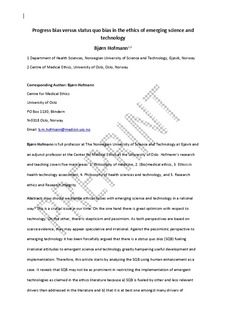Progress bias versus status quo bias in the ethics of emerging science and technology
Journal article, Peer reviewed
Accepted version

Åpne
Permanent lenke
http://hdl.handle.net/11250/2644243Utgivelsesdato
2019Metadata
Vis full innførselSamlinger
Sammendrag
How should we handle ethical issues related to emerging science and technology in a rational way? This is a crucial issue in our time. On the one hand, there is great optimism with respect to technology. On the other, there is pessimism. As both perspectives are based on scarce evidence, they may appear speculative and irrational. Against the pessimistic perspective to emerging technology, it has been forcefully argued that there is a status quo bias (SQB) fuelling irrational attitudes to emergent science and technology and greatly hampering useful development and implementation. Therefore, this article starts by analysing the SQB using human enhancement as a case study. It reveals that SQB may not be as prominent in restricting the implementation of emergent technologies as claimed in the ethics literature, because SQB (a) is fuelled by other and weaker drivers than those addressed in the literature, (b) is at best one amongst many drivers of attitudes towards emergent science and technology, and (c) may not be a particularly prominent driver of irrational decision‐making. While recognizing that SQB can be one driver behind pessimism, this article investigates other and counteracting forces that may be as strong as SQB. Progress bias is suggested as a generic term for the various drivers of unwarranted science and technology optimism. Based on this analysis, a test for avoiding or reducing this progress bias is proposed. Accordingly, we should recognize and avoid a broad range of biases in the assessment of emerging and existing science and technology in order to promote an open and transparent deliberation.